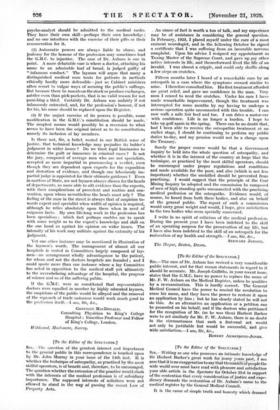[To the Editor of the SPECTATOR.] BIR,--The question of the
greatest interest and importance to the general public in this correspondence is touched upon by Mr. John Murray in your issue of the 14th inst. It is whether the technique of osteopathy, as practised by the most skilful operators, is of benefit and, therefore, to be encouraged. The question whether the extension of the practice would clash with the interests of the medical profession is of subsidiary importance. The supposed interests of solicitors were not allowed to stand in the way of passing the recent Law of Property Acts. . An ounce of fact is worth a ton of talk, and my experience may be of assistance in considering the general question. In February, 1923, I placed myself under the care of a most eminent neurologist, and in the following October he signed a certificate that I was suffering from an incurable nervous complaint. Upon his advice I resigned my appointment as Taxing Master of the Supreme Court, and gave up my other active interests in life, and thenceforward lived the life of an invalid. I was almost a cripple, and could only shuffle along a few steps on crutches.
Fifteen months later I heard of a remarkable cure by an osteopath in a case where the symptoms seemed similar to mine. I therefore consulted him. His first treatment afforded me great relief, and gave me confidence in the man. Very soon I ceased to need the crutches. Under his care I have made remarkable improvement, though the treatment was interrupted for some months by my having to undergo a serious operation quite unconnected with this trouble. I can now walk a mile fair heel and toe. I can drive a motor-car with confidence. Life is no longer a burden. I hope to take up golf again in the spring. There can be no doubt that, had I been able to receive the osteopathic treatment at an- earlier stage, I should be continuing to perform my public duties to-day, and my pension would not be a charge upon the Treasury.
Surely the proper course would be that a Government inquiry be held into the whole question of osteopathy, and whether it is in the interest of the country at large that the technique, as practised by the most skilful operators, should be encouraged under proper regulations and conditions and made available for the poor, and also (which is not less important) whether the unskilled should be prevented from practising. I would suggest that the principle of the Coal Mining Inquiry be adopted and the commission be composed of men of high standing quite unconnected with the practising medical profession or the osteopaths. Evidence would, of course, be heard from both these bodies, and also on behalf of the general public. The report of such a commission would carry great weight and would, I hope, give satisfaction to the two bodies who seem specially concerned.
I write in no spirit of criticism of the medical profession. During the present year I have been indebted to the skill of an operating surgeon for the preservation of my life, but I have also been indebted to the skill of an osteopath for the restoration of my health and strength.—I am, Sir, &c., The Mayne, Seaton, Devon. STEWART JOBSON.














































 Previous page
Previous page